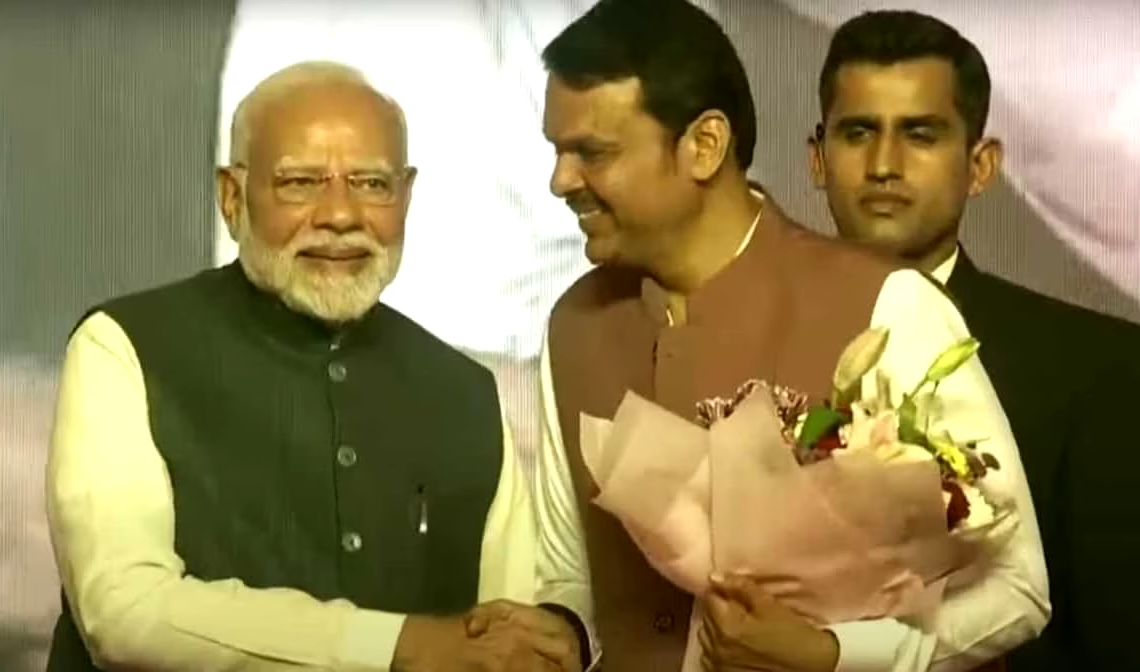
Devendra Fadnavis, the leader of the Bharatiya Janata Party (BJP), who emerged as the largest party in the Maharashtra elections and has previously served as the state’s Chief Minister twice, was sworn in as the 18th Chief Minister of Maharashtra. He took the oath of office and secrecy on Thursday evening at Azad Maidan in Mumbai. The oath was administered by Maharashtra Governor C.P. Radhakrishnan in the presence of Prime Minister Narendra Modi, Chief Ministers and Deputy Chief Ministers of 22 states, and a large number of Mahayuti alliance workers. This marks Fadnavis’ third term as Maharashtra's Chief Minister. Along with Fadnavis, the outgoing Chief Minister Eknath Shinde and Nationalist Congress Party (NCP) leader Ajit Pawar also took the oath as Deputy Chief Ministers. The other ministers of Fadnavis’ government are expected to take their oath in the coming days.
In the Maharashtra Assembly elections, BJP, in alliance with NCP (Ajit Pawar faction) and the Shinde-led Shiv Sena, achieved a massive victory over the Maha Vikas Aghadi alliance of Congress, Sharad Pawar’s NCP, and Uddhav Thackeray’s Shiv Sena. However, after this unprecedented victory, there was a period of intense deliberations regarding the selection of the Chief Minister. Ultimately, after 11 days, Fadnavis was chosen as the leader of the Mahayuti alliance and the BJP legislative party on Thursday. In the previous Mahayuti government, Eknath Shinde was made Chief Minister after splitting from Shiv Sena, with BJP’s Fadnavis reluctantly taking on the role of Deputy Chief Minister. However, this time the tables have turned, and BJP emerged as the largest party in the alliance, rewarding Fadnavis with the Chief Minister's post and making Shinde and Pawar Deputy Chief Ministers.
BJP won 132 seats in the Maharashtra Assembly, securing the highest number of seats in the Mahayuti alliance. With this, Devendra Fadnavis naturally became the leading contender for the Chief Minister’s post. In the previous elections, Fadnavis had made a significant sacrifice by stepping aside for the post of Chief Minister, as per the direction of BJP’s top leadership, an act that was publicly appreciated by Prime Minister Narendra Modi and Home Minister Amit Shah. However, this time, even after the results, it was not easy for Fadnavis to secure the position. He had to wait for 11 days to be chosen as the legislative leader of BJP.
On 4th December, Fadnavis was selected as the leader of the BJP legislative party. Prior to taking the oath on Thursday, Fadnavis visited the famous Siddhivinayak Temple in Mumbai to seek blessings from Lord Ganesha, followed by a prayer for the cow goddess. After the ceremony, Fadnavis took the oath as Chief Minister, followed by Shinde and Pawar taking the oath as Deputy Chief Ministers. The oath-taking ceremony was attended by Chief Ministers of two of the country’s largest states, Yogi Adityanath of Uttar Pradesh and Bhajan Lal Sharma of Rajasthan.
Immediately after assuming office, Fadnavis signed an order to provide a financial aid of ₹5 lakh from the Chief Minister’s Medical Relief Fund to Chandra Kant Shankar Kurhade from Pune for bone marrow transplant treatment. This swift action reflects Fadnavis’s commitment to health services and welfare, marking an important start to his third term.
Fadnavis has called a special session of the Maharashtra Assembly starting on December 7 to administer the oath to new legislators and elect a Speaker. Following this session, the state’s winter session will be held in Nagpur in mid-December. Sources suggest that Fadnavis will expand his cabinet before the winter session. In the previous Shinde government, the Mahayuti alliance had 28 ministers. This time, the number of ministers is expected to increase. Political analysts suggest that a 50:30:20 formula has been agreed upon, under which BJP will get 21, Shiv Sena (Shinde faction) 12, and NCP (Ajit Pawar faction) 10 ministerial posts. However, discussions regarding the distribution of ministerial portfolios could cause complications.
Political experts believe that Eknath Shinde, the former Chief Minister and Shiv Sena leader, had no other option but to accept the post of Deputy Chief Minister given the current situation. Experts suggest that Shinde had no choice but to accept the position as BJP holds the largest number of seats in the Mahayuti alliance. The Shinde faction had no alternative but to remain silently in power under BJP’s leadership. If BJP had not had a majority, discussions about making Shinde the Chief Minister could have been reconsidered.
In the Maharashtra Assembly elections, BJP’s strike rate was over 80%, while Shiv Sena and NCP’s strike rates were around 70%. Despite this, Shinde initially supported the decision for BJP to take the Chief Minister’s post but later went to his hometown under the pretext of being unwell. This raised questions in political circles, with some speculating that BJP may have applied emotional pressure on Shinde, citing Fadnavis’ sacrifice in the past. Some believe Shinde may have accepted the Deputy Chief Minister’s post due to practical reasons, as it would help Shiv Sena (Shinde faction) in securing a majority in upcoming municipal elections, as they cannot run the organization without power.
Political observers also suggest that in coalition governments, unless there are exceptions, the largest party naturally takes the leadership of the alliance. Just as Narendra Modi leads the NDA government for the third time at the center, the same logic applies in Maharashtra, where Fadnavis' assumption of the Chief Minister’s position is justifiable.
The future will reveal whether the Mahayuti alliance, formed by the confluence of three parties, will remain as pure and sacred as the confluence of the three rivers or, like the Janata Party government formed at the center in 1977, eventually split into separate factions.